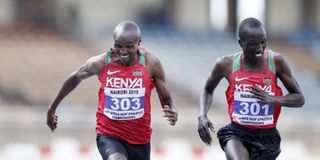Deaf athletes to resume activities next month

Kenya's Lucas Wanjiru (left) competes with teammate Jacob Kibet during the 3,000 metres steeplechase final during the first Africa Deaf Athletics Championships at Moi International Sports Centre, Kasarani on September 20, 2019.
What you need to know:
- This follows the Ministry of Sport’s decision last Friday to allow non-contact sports to resume in the country, but in accordance with Covid-19 containment protocols
- DAAK’s Public Relation Officer Tom Okiki told Nation Sport that most of their members have been reaching out to them, seeking to know when they plan to restart competitions
- Deaf athletes are among sportpersons in the country who have been hit hard by the Covid-19 pandemic
Deaf Athletics Association of Kenya (DAAK) have hinted at resuming their activities either in November or December.
This follows the Ministry of Sport’s decision last Friday to allow non-contact sports to resume in the country, but in accordance with Covid-19 containment protocols.
Athletics is among disciplines that were classified under non-contact sports, and allowed to resume, as the ban on contact sports, which include football, volleyball, boxing, Tae Kwon Do and netball remained in force.
DAAK’s Public Relation Officer Tom Okiki told Nation Sport that most of their members have been reaching out to them, seeking to know when they plan to restart competitions.
He said that they have already initiated talks with their stakeholders on how to stage the events in accordance with all the set protocols.

David Wamira celebrates winning the 200 metres men's final during the first Africa Deaf Athletics Championships at Moi International Sports Centre, Kasarani on September 18, 2019.
“Most of our athletes are very happy and they are asking us when local events like the marathon and cross country will take place. We have asked them to wait patiently as we are still in the process of consultation with stakeholders,” said Okiki.
For the para-athletes, and other groups with underlying conditions, the guidelines dictate that a dedicated Covid-19 compliant training site should be established for them.

Kenya's Beryl Wamira sprints to the finishing line to win the 200 metres final during the first Africa Deaf Athletics Championships at Moi International Sports Centre, Kasarani on September 18, 2019.
Event organisers should also put in place alternative formats of communication creating awareness on Covid-19, such as electronic information boards, braille, sign-language and enhanced signage communication.
Management of sports federations, training camps, sports academies, sports facilities and other sports institutions have been tasked with enforcement of the protocols.
Those that fail to adhere to them risk being prosecuted, and their compliance certificate suspended or revoked.
“We will adhere to the containment measures when organising local events to prevent the spread of Covid-19 and for the well-being of our athletes,” assured Okiki.
Deaf athletes are among sportpersons in the country who have been hit hard by the Covid-19 pandemic. As at March when the government banned sports activities in the country, they had not taken part in any competition this year.
With the World Deaf Athletics Championships that was re-scheduled for September 28-October 3 in Radom, Poland being postponed to 2022, DAAK said the half marathon, which was earlier scheduled for April 26 this year in Nakuru is one of the events they are likely to start with.
The National Deaf Track and Field Championships is the other event that was interrupted by the pandemic. It had been slated for May 29-30 at Moi International Sports Centre, Kasarani.




